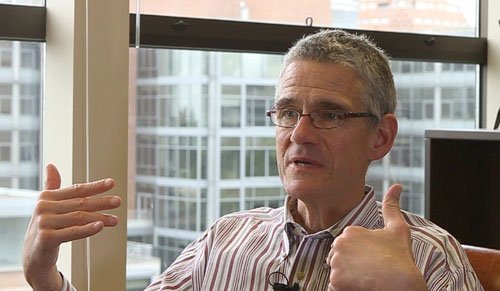With more than 65 percent of the public fundraising needs achieved for an upcoming expansion, the dean of Portland State’s School of Business Administration, Scott Dawson, met with the Vanguard to discuss plans for the school’s new building.
Q-and-A with SBA Dean Scott Dawson

With more than 65 percent of the public fundraising needs achieved for an upcoming expansion, the dean of Portland State’s School of Business Administration, Scott Dawson, met with the Vanguard to discuss plans for the school’s new building.
After a recent anonymous $8 million gift from a PSU alumnus and his wife, total funds raised for the new building have reached $13.2 million. The project is anticipated to cost $60 million, with $40 million expected to come from the state and the remaining $20 million expected to be contributed by PSU. Now, only $6.8 million remains to be raised.
The initial stages of the project date back to 2007. However, following the economy crash in 2008, the project stalled. Dawson explained that support for the new building began to grow again in the last two or three years.
Vanguard: Can you explain some of the existing problems with this building that prompted the need for a new building?
Scott Dawson: I would start with a general statement, which is to say that the community needs to have great talent, and that talent will come from the business school. If the business school is going to attract great talent [to start] with, having a great building is part of the equation. Right now we don’t have one. While I don’t mean to imply that we don’t currently have great talent, it is fair to assume that if a prospective student is on the bubble between our school, and, say, [the] University of Washington, we do not have a competitive facility.
One of the existing problems is that, as an undergrad, probably over 50 percent of your courses would not be [housed] in the business school. The graduate courses receive priority in terms of having more of their classes located in the SBA. Those classrooms that are available for use in the SBA tend to be poorly designed. Often the classrooms are not designed for students and their professor to move about freely and interact.
Also, in business as in many other fields of education, much of the learning takes place outside of the classroom. We do a lot of teamwork both at the graduate and undergraduate level. Currently, there are two rooms available for group work. However, often the two rooms are used for language classes and faculty meetings and are barely open to students. So that is an important concern.
Another deficit of our building is that our centers lack adequate space. We have centers for real estate, retail leadership, innovation and entrepreneurship and sustainability. Our centers are like our retail doorway into the community. At most, some centers have half the amount of space they need, while others don’t have any official space at all. For example, when companies come here to recruit students, faculty members must vacate their offices so that there will be a space for the recruiting to actually take place.
Another really critical part of the issue with our current building is what we would call unassigned space. Now, if you walk around our building, you’ll find that there is almost no space that is unused. While one might think that is efficient, the true result is that the building is not welcoming to students. We want a place where people want to be, a place that feels like a community. Part of that will be finding retail, such as food and beverage, [vendors] in order to make our facility an additive to the campus, rather than simply a building that holds business classes.
VG: Who are some of the other major donors?
SD: Our largest corporate gifts have come from Tektronix [Inc.] and The Standard, which both gave gifts of $250,000. Two gifts that large from [corporations] is very beneficial, and also a bit surprising, as it is not common [to get] such large corporate gifts. Smaller corporate donors include PacifiCorp, Nike and a variety of others.
We feel confident that more will…come, as well. The general thought is that once a few companies decide to donate, they lead the trend for others to follow.
Then, on the private side, we have gotten a number of million-dollar gifts, including one from a Saudi alumnus. Also, Bill Swindells, who is a well-known name here in the SBA, gave us a seven-figure gift.
VG: We talked with Bob Speltz, the director of public affairs at The Standard, and he said one of the biggest reasons the donation was made was that a number of employees had either received their degree from the PSU School of Business or were currently pursuing it. Would you agree that by investing in this school these companies are, in a way, investing in themselves?
SD: Absolutely—that is exactly the case you make to a corporation when you ask for money for a project like this. The Standard is a great example because they have hundreds of alumni there. Another example is Intel. Not many people realize PSU has more alumni at Intel than any other university. So does it make sense for them to invest in a good school? Heck yes.
VG: Just sum it up in one or two sentences: Why is it so important that this new building is built at PSU?
SD: Well, I have [a] quote from a student currently enrolled in our master’s [in] business administration program. I asked her what she thought of the program and she replied with, “You know, it’s just like good caviar in a bad tin can.” And that, I feel, is a great quote. It really sums it up quite well.





